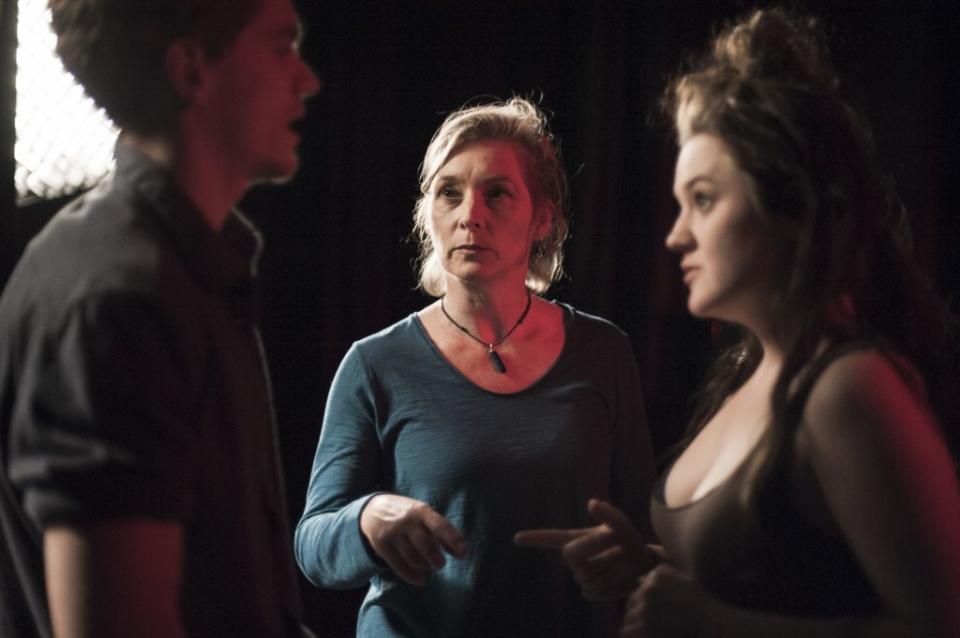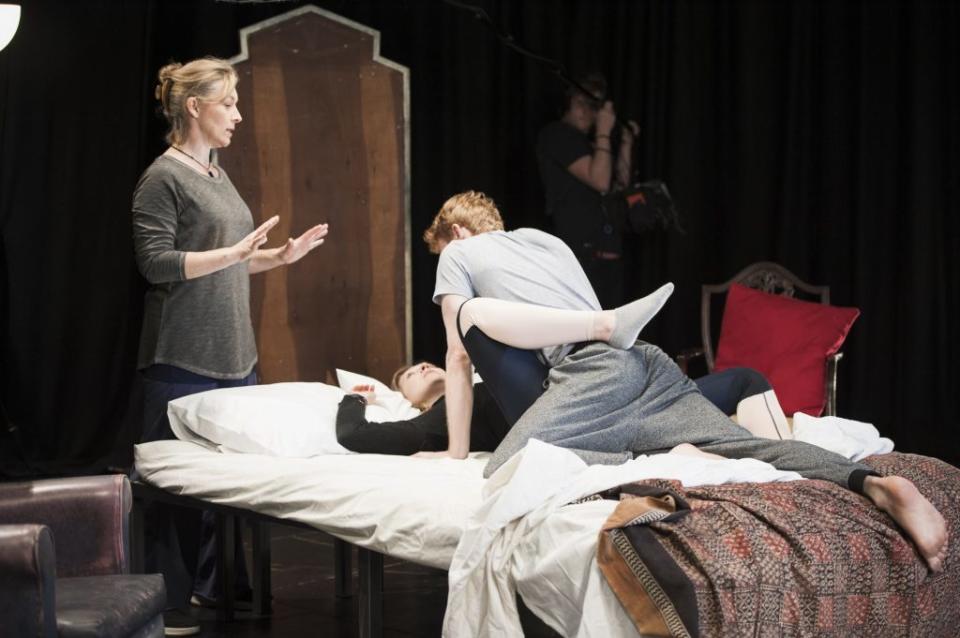Intimacy coordinator reveals dark secrets of Hollywood sex scenes: 'It was the elephant in the room'
During a recent Hollywood Reporter roundtable discussion with the cast of hit HBO series “Big Little Lies,” actress Nicole Kidman made a startling revelation about filming one of the show’s more intimate scenes.
“I remember lying on the floor in the last episode, being in my underwear and having just been really thrown around,” Kidman shared of her experience. “I just lay on the floor. I couldn’t get up. I didn’t want to get up. And I remember [director] Jean-Marc [Vallée] coming over and putting a towel over me in between the takes because I was just like … I just felt completely humiliated and devastated. And angry inside.”
“There was no rehearsal” for the deeply personal scene, according to Kidman — “there was just, walk into the room and do the scene, and [Vallée] would shoot it.”
Kidman’s story — one of having her personal boundaries violated on set in a manner that left her hurt and embarrassed — is harrowing, but it’s sadly not unique. It is one of the many dangers of not having an intimacy coordinator like Ita O’Brien on the set of a production.
‘You’re going to need a choreographer’
O’Brien, a pioneer in her industry whose impressive resume includes “Sex Education, “Watchmen,” “Normal People” and “I May Destroy You,” explained to In The Know that during the pre-#MeToo era, many in the entertainment industry lacked awareness that intimate content needed to be directed with just as much professionalism as any other type of scene.

“If you’re going to [shoot] a dance [scene], you know that people don’t know how to tango,” said O’Brien. “You know you’re going to need a choreographer who can teach the steps, who can choreograph it really clearly to give you the best dance possible.”
“You know that if you’re going to do a fight [scene], you’re going to bring in a stunt coordinator to teach the techniques and to choreograph that fight to make it exciting so the directors are going to get the best scenes possible,” she continued.
“And yet, the intimate content historically wasn’t [treated in the same fashion].”
This is where O’Brien comes in. As an intimacy coordinator, she creates open communication and transparency throughout the whole production staff and establishes a process that allows actors to agree and consent to scenes involving their bodies on a more intimate level.
“That is of touch, of simulated sexual content and of nudity,” she explained.
‘Open, autonomous, and comfortable’
Beyond the exceptionally important task of establishing consent, O’Brien’s work also involves choreographing sex scenes based on what actors are comfortable with.
An intimacy coordinator not only leaves vulnerable talent feeling protected on set, but also makes sex scenes look polished, believable and even “hotter” — says O’Brien — just as a tango instructor would do with a dance scene.
“Because the actor can stay open, autonomous and comfortable, they can give their all to the intimate content,” she explained. “And then we, as the audience, can stay enjoying the sizzlingness of the intimate content. I do feel that clear choreography helps scenes to be better, and, therefore, helps us to make hotter sex scenes.”

‘It was the elephant in the room’
Better sex scenes and happy, safe actors? Sounds like a win-win. So why wouldn’t all productions be chomping at the bit to bring an intimacy coordinator on set?
As O’Brien points out, there are multiple reasons why professionalism and direction have historically been — and continue to be — forsaken when it comes to sex scenes.
“First of all, people are embarrassed to talk about intimate content,” she explained. “It was the elephant in the room, both the intimate content and the nudity that might be required.”
On top of the discomfort that may come with discussing intimacy, O’Brien says that on many production sets of days past, there was a general sense that, since “everybody does sex,” it wasn’t a skill that needed to be taught.
This dangerous precedent has left actors and actresses vulnerable to traumatic experiences like Kidman’s on the set of “Big, Little Lies,” which can have serious and long-lasting consequences.
‘Just take it off’
Without the open communication surrounding consent that intimacy coordinators facilitate, O’Brien says that actors often turn up on the day of a shoot and have things “sprung on them that they weren’t expecting.”
To avoid seeming like a “troublemaker” or “diva” in such situations, actors may feel coerced into performing in intimate scenes that are out of their comfort zone.
“For example,” O’Brien shared, “an actor that I worked with, she had agreed that she would keep her bra on throughout [an intimate scene]. And then, the director goes, ‘Oh, for goodness [sake], I keep on catching your bra in the shot. Just take it off.'”
“Then, in that moment, with the lights [on], with the crew all standing around, she took her bra off and then she’s instantly going, ‘Oh, this is exactly what I didn’t want,'” she continued. “So again, just someone being coerced, being put into a place of being absolutely vulnerable and coming home and feeling that gut-wrenching feeling that you’ve overstepped your own boundaries.”

This type of coercion is not just used against small-time actors — it plagues A-list talent as well.
“I was on a panel discussion with a Swedish actress, a really well-renowned Swedish actress,” O’Brien recalled. “And she said, ‘Every single sex scene that I have done, it has cost me.’ That’s how she put it: ‘It just cost me.'”
“You know, you’d think someone of her caliber was in a position to be able to call for what she really needed in order to be able to do the intimate content in a really good way so it didn’t end up costing her,” she added.
‘Better work across the board’
For the last six years, O’Brien has been developing a set of best practices when working with intimacy, scenes with sexual content and nudity in film, TV and theater. Her work has culminated in the Intimacy on Set Guidelines, an official code of conduct surrounding intimacy on set or stage. The guidelines are the first of their kind to exist in the U.K.
As Hollywood giants like Harvey Weinstein face their reckonings amid the #MeToo movement, O’Brien says there has been an increased interest in both her profession and her code, a major step forward for the entire industry.
“The #MeToo movement and the Time’s Up movement were absolutely imperative regarding the role of the intimacy coordinator and intimacy guidelines being welcomed in the industry,” she explained.
Through her pioneering work, O’Brien says she hopes to not only allow actors to feel autonomous and empowered, but also to show the world that intimacy coordinators create “better work across the board” and allow for vastly improved storytelling.
“We are bringing not just agreement and consent, but [also] clear choreography and skills as the intimacy coordinator,” she said, “so that we can create better content, make sure we’re honoring the writing, honoring the director’s vision, honoring the storytelling and make sure our actors have an opportunity to professionally and openly share their boundaries, [and know] their boundaries aren’t just allowed to be spoken about, but are invited.”
If you found this article useful, read about this incredibly problematic sex metaphor — as well as its perfect replacement.
More from In The Know:
Deaf, transgender model Chella Man shares how to be a better ally for people with disabilities
These chic blue light glasses can help you get a better night’s sleep
Pluto Pillow will build you a personalized pillow based on your sleep position
Blind skateboarder Ryusei Ouchi has never let his disability hold him back
The post Intimacy coordinator reveals massive issue with Hollywood sex scenes appeared first on In The Know.
